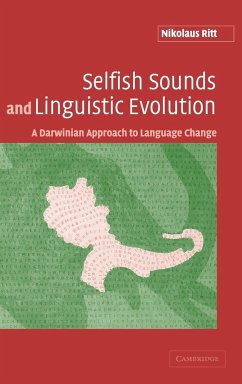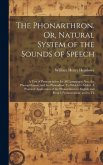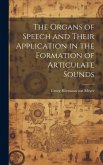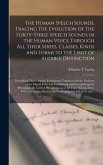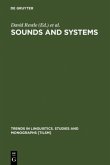Short description/annotation
This book uses Darwin's evolutionary theory to account for language development and change.
Main description
This book takes an exciting new perspective on language change, by explaining it in terms of Darwin's evolutionary theory. Looking at a number of developments in the history of sounds and words, Nikolaus Ritt shows how the constituents of language can be regarded as mental patterns, or 'memes', which copy themselves from one brain to another when communication and language acquisition take place. Memes are both stable in that they transmit faithfully from brain to brain, and active in that their success at replicating depends upon their own properties. Ritt uses this controversial approach to challenge established models of linguistic competence, in which speakers acquire, use, and shape language. In Darwinian terms, language evolution is something that happens to, rather than through, speakers, and the interests of linguistic constituents matter more than those of their human 'hosts'. This book will stimulate debate among evolutionary biologists, cognitive scientists and linguists alike.
Table of contents:
1. Introduction; 2. The historical perspective; 3. Approaching 'language change'; 4. The Darwinian approach; 5. Generalising Darwinism; 6. Towards an evolutionary theory of language; 7. What does all this imply for the study of language change(?)33;; 8. How to live with feet, if one happens to be a morph-meme; 9. The prosodic evolution of English word forms or the great trochaic conspiracy; 10. Conclusion.
Hinweis: Dieser Artikel kann nur an eine deutsche Lieferadresse ausgeliefert werden.
This book uses Darwin's evolutionary theory to account for language development and change.
Main description
This book takes an exciting new perspective on language change, by explaining it in terms of Darwin's evolutionary theory. Looking at a number of developments in the history of sounds and words, Nikolaus Ritt shows how the constituents of language can be regarded as mental patterns, or 'memes', which copy themselves from one brain to another when communication and language acquisition take place. Memes are both stable in that they transmit faithfully from brain to brain, and active in that their success at replicating depends upon their own properties. Ritt uses this controversial approach to challenge established models of linguistic competence, in which speakers acquire, use, and shape language. In Darwinian terms, language evolution is something that happens to, rather than through, speakers, and the interests of linguistic constituents matter more than those of their human 'hosts'. This book will stimulate debate among evolutionary biologists, cognitive scientists and linguists alike.
Table of contents:
1. Introduction; 2. The historical perspective; 3. Approaching 'language change'; 4. The Darwinian approach; 5. Generalising Darwinism; 6. Towards an evolutionary theory of language; 7. What does all this imply for the study of language change(?)33;; 8. How to live with feet, if one happens to be a morph-meme; 9. The prosodic evolution of English word forms or the great trochaic conspiracy; 10. Conclusion.
Hinweis: Dieser Artikel kann nur an eine deutsche Lieferadresse ausgeliefert werden.

